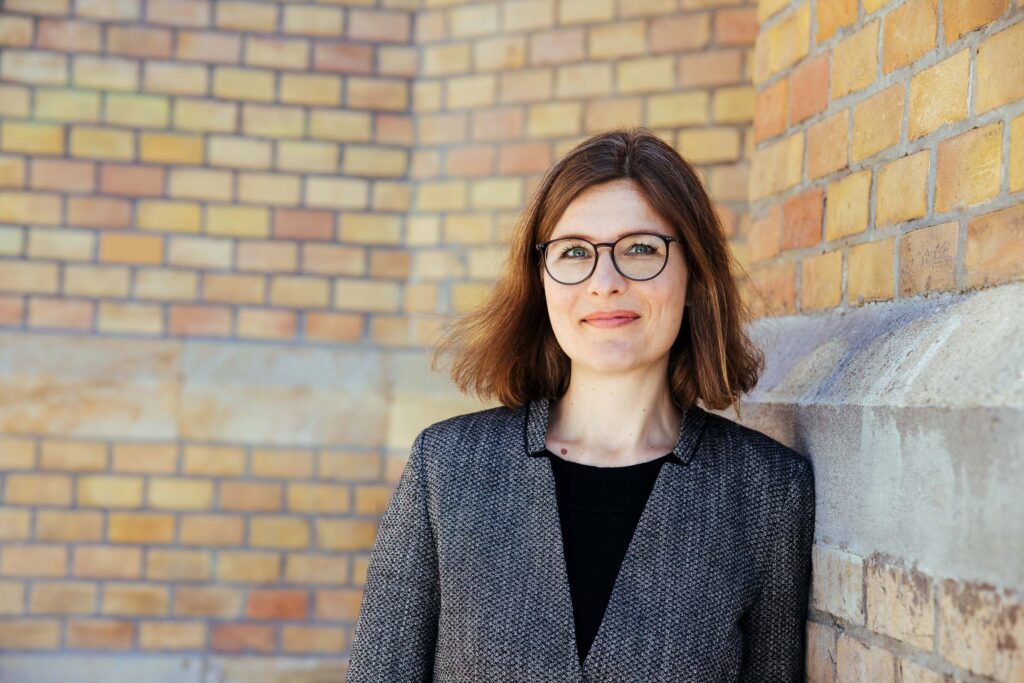
E-Mail-Adresse: [email protected]
Postanschrift: Postfach 700822, 22008 Hamburg
Telefonnummer: +49(0)40/6541-2310
Besuchsadresse: Holstenhofweg 85, 22043 Hamburg
Raum/ Gebäude: H 1, Raum 2369
Sprechzeit: Nach Vereinbarung.
Sekretariat: Britta Neumann
T +49(0)40/6541-2366
Über Olga
Privatdozentin Dr. Olga Klimecki ist Neurowissenschaftlerin und Psychologin. Derzeit ist sie kommissarische Lehrstuhlinhaberin für Sozialpsychologie an der Universität der Bundeswehr in Deutschland.
Sie promovierte an der Universität Zürich, Schweiz, im Fachbereich Philosophie (Dr. phil., summa cum laude) und habilitierte sich im Fachbereich Naturwissenschaften (Dr. rer. nat. habil.) an der Technischen Universität Dresden, Deutschland. An letzterer war sie in den Jahren 2020 und 2021 als Gastprofessorin für Psychologie sowie in den Jahren 2024 und 2025 als kommissarische Professorin für Biologische Psychologie tätig.
Ihr Forschungsinteresse gilt der Förderung von psychischer und physischer Gesundheit sowie der Verbesserung interpersonaler und intergruppaler Beziehungen über die gesamte Lebensspanne hinweg. Konkret untersucht Olga Klimecki gemeinsam mit ihrem Team in randomisiert-kontrollierten Studien die kausalen Effekte von Verhaltens-, Kognitions- und Emotionsinterventionen. Ein weiterer Fokus ihrer Forschung liegt auf den bio-psycho-sozialen Wirkmechanismen, insbesondere im Hinblick auf Hirnfunktionen und -konnektivität, Emotionen sowie zwischenmenschliches und intergruppales Verhalten.
Olga Klimecki ist (Ko-)Autorin von über 80 wissenschaftlichen Publikationen. Für ihre Arbeiten zur neuronalen Plastizität und Konfliktlösung wurde sie mehrfach ausgezeichnet, unter anderem mit dem Early Career Award der Society for Social Neuroscience in Washington D.C., einem Marie-Curie-Stipendium sowie einem Horizon2020-Forschungsgrant der Europäischen Kommission.
Als Ko-Sprecherin der bislang längsten Meditationsstudie – der Medit-Ageing / Silver-Health-Studie – verantwortete sie ein von der Europäischen Kommission mit insgesamt 7 Millionen Euro gefördertes Projekt. Seit 2013 leitet sie Forschungsprojekte zur Konfliktlösung in verschiedenen Ländern.
Ihre wissenschaftliche Arbeit findet breite Resonanz in nationalen und internationalen Medien, darunter arte, BBC, Die Zeit, Der Spiegel, The Independent, RTS und ZDF.
Wichtige Publikationen:
Cernadas Curotto, P., Sander, D., Halperin, E., & Klimecki, O., (2023) Getting closer: Compassion training increases feelings of closeness toward a disliked person. Scientific Reports. [IF 4.6; OA]
Cernadas Curotto, P., Sander, D., d’Argembeau, A., Klimecki, O. (2022). Back to the future: a way to increase prosocial behavior. PLoS One. [IF 3.8; OA]
Bogacz, F., Pun, T., & Klimecki, O. M. (2020). Improved conflict resolution in romantic couples in mediation compared to negotiation. Humanities & Social Sciences Communications, 7: 131. [IF 3.5; OA]
Klimecki, O., Vétois, M., & Sander, D. (2020). The impact of empathy and perspective-taking instructions on proponents and opponents of immigration. Humanities & Social Sciences Communications, 7: 91. [IF 3.5; OA]
Rafi, H., Bogacz, F., Sander, D., & Klimecki, O.M. (2020). Impact of Couple Conflict and Mediation on How Romantic Partners Are Seen: an fMRI study. Cortex, 130, 302-317. [IF 4.28]
Klimecki, O. (2019). The role of empathy and compassion in conflict resolution. Emotion Review, 11(4), 310–325. [IF 4.07]
Klimecki, O.M., Sander, D., & Vuilleumier, P. (2018). Distinct brain areas involved in anger versus punishment during social interactions. Scientific Reports, 8, 10556. [IF: 5.58; OA; Part of Top 100 in Neuroscience]
Klimecki, O.M., Mayer, S.V., Jusyte, A., Scheeff, J., & Schönenberg, M. (2016). Empathy promotes altruistic behavior in economic interactions. Scientific Reports, 6, 31961. [IF 5.58; OA]
Klimecki, O.M., Vuilleumier, P., & Sander, D. (2016). The impact of emotions and empathy-related traits on punishment behavior: Introduction and Validation of the Inequality Game. PLoS One, 11(3): e0151028. [IF 3.23; OA]
Klimecki, O.M. (2015). The Plasticity of Social Emotions. Social Neuroscience. 10, 466-473. doi: 10.1080/17470919.2015.1087427 [IF 3.65]
Singer, T., & Klimecki, O.M. (2014). Empathy and Compassion. Current Biology, 24, R875-R878. [IF 10.83; OA]
Klimecki, O., Leiberg, S., Ricard, M., & Singer, T. (2014).Differential Pattern of Functional Brain Plasticity after Compassion and Empathy Training. Social, Cognitive and Affective Neuroscience, 9, 873–879. [IF 7.37; OA]
Bernhardt, B.*, Klimecki, O.*, Leiberg, S., & Singer T. (2014). Structural Covariance Networks of the Dorsal Anterior Insula Predict Females’ Individual Differences in Empathic Responding. Cerebral Cortex, 24, 2189-98. [IF 8.67; OA] *shared first authorship
Klimecki,O., Leiberg, S., Lamm, C., & Singer, T. (2013). Functional neural plasticity and associated changes in positive affect after compassion training. Cerebral Cortex, 23, 1552–1561. [IF 8.67; OA]
Leiberg, S., Klimecki, O., & Singer, T. (2011). Short-term compassion training increases prosocial behavior in a newly developed prosocial game. PLoS One, 6, e17798. [IF 3.23; OA]
Für eine vollständige Publikationsliste siehe: https://scholar.google.de/citations?user=QKjZBUIAAAAJ&hl=de&oi=ao
Letzte Änderung: 14. April 2025